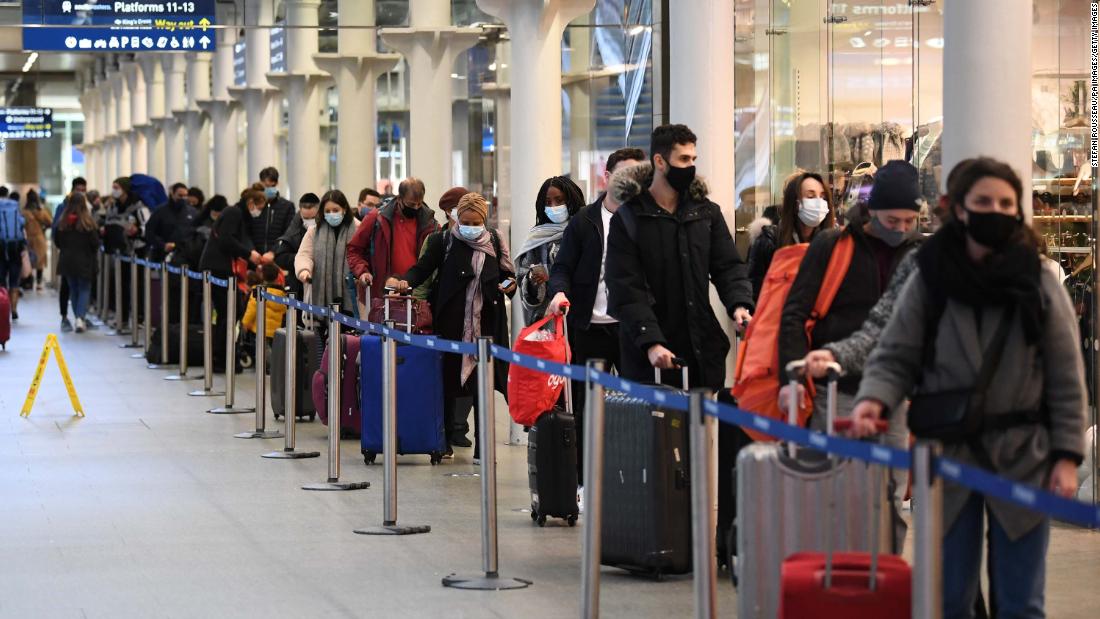
The new variant is called VUI-202012/01 – the first “Variant Under Investigation” in the UK in December 2020. As scientists search for more information about the variant, its impact is already being felt.
Multiple countries have now imposed restrictions on travelers from the UK. British Health Secretary Matt Hancock said on Sunday that the variant “got out of hand” and that Prime Minister Boris Johnson would chair an emergency meeting on Monday as his government tried to contain the fallout.
Here’s What You Should Know.
According to the U.S. Centers for Disease Control and Prevention, a variant occurs when the genetic structure of a virus changes. All viruses mutate over time and new variants are common, including for the new coronavirus.
Chris Whitty, England’s chief medical officer, said this particular variant “contains 23 different changes,” an unusually large number of which he described. Whitty said the variant was responsible for 60% of new infections in London, which have nearly doubled in the past week alone.
That finding has immediate implications for virus control. More cases could put even greater pressure on hospitals and health care personnel as they enter an already particularly difficult winter period, ultimately leading to more deaths.
Where does the variant come from and how did it develop?
According to the World Health Organization, the new variant of Covid-19 originated in South East England.
PHE has said that back-tracing, using genetic evidence, suggests the variant first showed up in England in September. Then it circulated at very low levels until mid-November.
The increase in the number of cases related to the new variant first came to light in late November when PHE investigated why the infection rates in Kent [in southeast England] did not fall despite national restrictions. We then found that a cluster associated with this variant quickly spread to London and Essex, ”said PHE.
Multiple experts have also suggested that this new variant could have been amplified due to a superspreader event, meaning that in cases the current spike could also have been caused by human behavior.
“A higher genomic growth rate in the sequenced samples does not necessarily mean higher transmissibility, for example if there was a rave of several thousand people introducing this variant and infecting many people, especially in that rave, this seem very high compared to a lower background of non-variable virus, ”Julian Tang, clinical virologist at the University of Leicester, told the Science Media Center.
Which countries are affected?
The variant has already spread worldwide. In addition to the UK, the variant has also been found in Denmark, the Netherlands and Australia, according to WHO.
Australia has identified two cases of the variant in a quarantine area in Sydney, and Italy has also identified one patient infected with the variant.
A similar but distinct variant has also been identified in South Africa, where scientists say it is rapidly spreading along coastal areas of the country.
Is the new variant more deadly?
There is no indication that the new variant is now more deadly, Whitty said, who said “urgent work” was underway on Saturday to investigate the implications for mortality.
“We do not see increased virulence (clinical severity) or major changes in blood pressure [spike protein] that the vaccine’s effectiveness will diminish – until now, “Tang told the Science Media Center (SMC.)
Several experts have pointed out that for some viruses, increasing transmissibility may be accompanied by decreasing virulence and death rates. This could mean that the variant is less deadly, although it is currently too early to tell.
“New viruses will adapt to a new host over time – with decreasing mortality and possibly increasing transmissibility,” said Tang.
“As viruses are transmitted, viruses can be selected that allow for more virological ‘success’, changing the properties of the virus over time. This typically leads to more transmission and less virulence,” said Martin Hibberd, professor of emerging infectious diseases at the London School of Hygiene & Tropical Medicine, the SMC said.
Do the developed vaccines work against this variant?
Whitty said on Saturday that current vaccines should still work against the new variant.
His remarks were echoed in the US by the chief of Operation Warp Speed. “So far I don’t think there is one variant that would be resistant to the vaccine,” Moncef Slaoui told CNN on Sunday. “We can’t rule it out, but it’s not here now.”
The UK, US and EU have approved the Pfizer / BioNTech Covid-19 vaccine, and several others are in development.
What measures are being taken to contain the variant?
The UK Chief Medical Officer has urged people in Britain to take steps to reduce the spread of the virus.
“Given this latest development, it is now more important than ever that the public continues to take action in their area to reduce carryover,” Whitty said Saturday.
Much of England, including London and the Southeast, is now under strict Tier 4 Covid-19 restrictions, just the latest disruption of a Christmas holiday overshadowed by the pandemic.
Dozens of countries in Europe, the Middle East and America have also announced a travel ban for the UK.
Others, such as Greece and Spain, have imposed restrictions requiring travelers arriving from Britain to undergo coronavirus testing or quarantine.
America’s top infectious disease expert, Dr. Anthony Fauci, told CNN on Monday that he would advise against additional restrictions on UK travel. The US should “undoubtedly watch it,” Fauci said, but “we don’t want to overreact.”